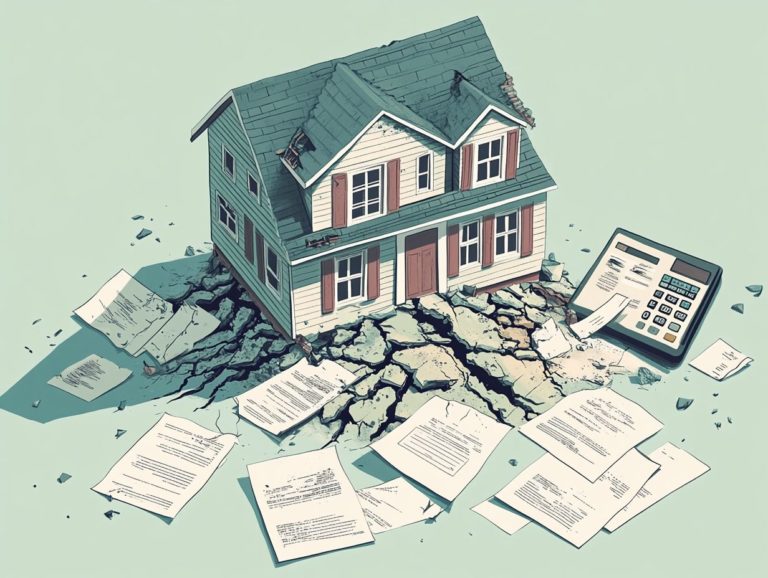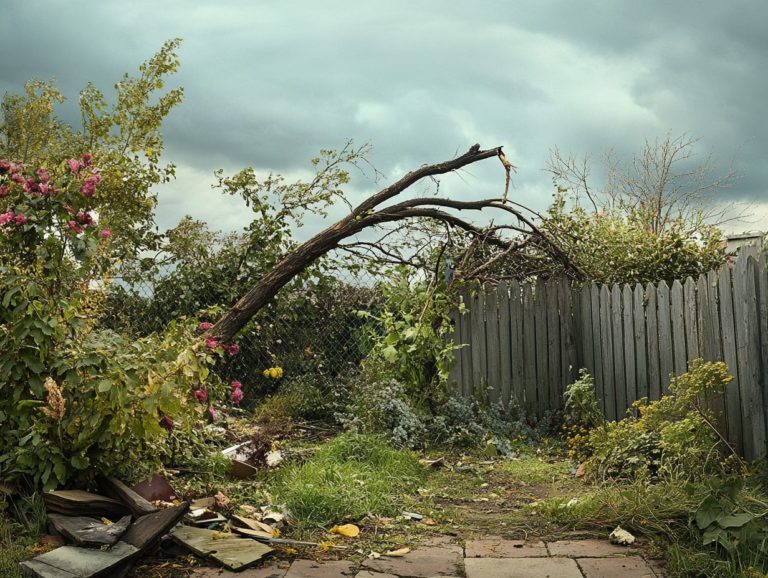What Does Home Insurance Cover?
Home insurance is more than just a safety net; it is a crucial part of protecting your most significant investment your home.
Whether you re stepping into homeownership for the first time or reassessing your existing policy, grasping the various types of coverage is essential.
From dwelling and personal property coverage to liability protection, each component plays a critical role in preserving your assets.
In this article, you’ll discover what home insurance encompasses, common exclusions, expert tips for selecting the ideal policy, and strategies to save on premiums. This ensures you are fully equipped for whatever life may present.
Contents
- Key Takeaways:
- Understanding Home Insurance Coverage
- Types of Home Insurance Coverage
- What Home Insurance Does Not Cover
- Choosing the Right Home Insurance Policy
- Making a Home Insurance Claim
- Tips for Lowering Home Insurance Costs
- Frequently Asked Questions
- Are Personal Liability Claims Covered by Home Insurance?
- Does Home Insurance Cover Additional Living Expenses?
Key Takeaways:

Home insurance covers your dwelling, personal property, liability, and living expenses due to unforeseen events like theft, fire, or natural disasters. To learn more about what home insurance covers, it’s important to review your policy details.
Understand common exclusions like flood or earthquake damage, and consider getting extra coverage for these risks.
When choosing the right home insurance, factor in the value of your home and belongings, your location, and the level of coverage you need.
Regularly review and update your policy to ensure adequate coverage.
Understanding Home Insurance Coverage
Understanding what home insurance is coverage is essential for you as a homeowner to protect your property and assets. A well-structured homeowners insurance policy offers comprehensive protection against various risks, including physical damage to your dwelling and liability for injuries.
It also covers additional living expenses if significant damage forces you to relocate.
Factors such as coverage limits and the types of damage covered are crucial in determining the right level of insurance for your situation. You should also be aware of coverage exclusions, deductible amounts, and the importance of shopping around for policies.
This diligence will help you find the best insurance company tailored to your unique needs.
What is Home Insurance?
Home insurance, often known as homeowners insurance, is a specialized policy designed to protect your residential property from various risks and liabilities. Understanding why you need home insurance is essential, as this coverage typically protects against damages from fire, theft, vandalism, and select natural disasters, offering you a crucial safety net.
It also includes personal liability coverage, shielding you from legal claims related to injuries or damages that may occur on your property. Understanding the specific terms of your insurance policy is essential, as it outlines the scope of coverage and the circumstances under which you can file claims.
By maintaining a transparent relationship with your insurance provider, you can stay informed about your coverage options and any potential exclusions, ensuring you secure vital financial support when you need it most.
Types of Home Insurance Coverage
You have various home insurance coverage options available, each designed to provide unique protection for different aspects of your property and potential liabilities.
Choosing the right type ensures that your home is safeguarded in the best possible way.
Dwelling Coverage
Dwelling coverage is an essential part of your homeowners insurance, designed to protect the very structure of your home from various potential damages. To understand this better, you can learn about Coverage A in home insurance. This protection is vital because, if you experience incidents such as fire, vandalism, or natural disasters like floods and earthquakes, your insurance can help cover repair costs.
It s crucial for you to grasp the specific protections included in your policy and to regularly evaluate your coverage limits. By assessing these limits, you ensure that your entire home is adequately protected, preventing financial strain from unexpected damages.
This diligence not only safeguards your investment but also grants you the peace of mind you deserve.
Don t wait until it’s too late secure the right coverage now! Start comparing home insurance policies today to protect your most valuable asset!
Personal Property Coverage

Personal property coverage in your homeowners insurance is your safety net. It protects your belongings and offers peace of mind against loss or damage.
This coverage includes items like furniture, electronics, clothing, and valuables. However, high-value items like jewelry may need extra coverage for full protection.
Know your policy limits to avoid surprises. Each policy has a maximum payout for specific categories.
Familiarize yourself with the claims process. Properly documenting and reporting lost or damaged belongings can significantly ease stress.
Liability Coverage
Liability coverage is a vital part of homeowners insurance. It protects you financially if someone gets injured or their property is damaged on your property.
This coverage is crucial in slip-and-fall incidents where a guest gets hurt. The costs from such accidents can be overwhelming, from medical bills to legal fees.
Personal injury coverage also protects you from claims like defamation or invasion of privacy. This coverage helps you face unexpected accidents with confidence.
Additional Living Expenses Coverage
This coverage provides financial support if you need to temporarily relocate due to covered events like natural disasters. It ensures you can maintain stability without overwhelming costs.
Covered costs often include hotel stays and meals while you re away from home. This aspect acts as a safety net, letting you focus on recovery.
What Home Insurance Does Not Cover
Homeowners insurance offers strong coverage, but be aware of exclusions to avoid unexpected costs. Knowing these limits helps you stay protected.
Common Exclusions
Understanding common exclusions in your policy is essential to your protection. Many people don t realize that standard homeowners insurance often doesn t cover certain risks.
For example, external flooding from heavy rains is usually not included. Theft from unsecured areas may also be excluded, so ensure your home is secure.
Maintenance issues like mold and pest infestations typically aren t covered. Evaluate your insurance needs and consider additional coverage options to fill gaps.
Choosing the Right Home Insurance Policy

Choosing the right home insurance policy involves careful evaluation. Ensure you achieve both comprehensive coverage and affordability to meet your needs.
Factors to Consider
Here’s what you need to know! When selecting a home insurance policy, several critical factors will influence your coverage and costs.
First, consider the deductible options. Opting for a higher deductible can lower your premium, but it may also lead to greater out-of-pocket expenses when filing a claim.
Next, think about coverage limits. Insufficient coverage could leave you vulnerable in the event of a disaster.
If you own high-value items like collectibles or fine art, specialized coverage is essential to ensure these treasures are adequately protected.
Each of these factors plays a significant role in your insurance’s overall effectiveness and aligns with your personal financial goals, allowing you to safeguard your assets while managing expenses responsibly.
Making a Home Insurance Claim
Navigating the home insurance claims process can be intricate. However, understanding the steps involved can significantly streamline your experience as a homeowner dealing with property damage.
Steps to Take
Act fast! Following these steps is vital for a successful insurance claim. This means understanding your policy and taking a methodical approach to the claims process.
- Start by conducting a thorough assessment of the damage. Be meticulous in documenting all affected areas and items, as this information serves as vital evidence.
- Next, gather essential documentation, including photographs, repair estimates, and any relevant receipts. These will be critical in supporting your claim.
- Effective communication with your insurance company can significantly influence the outcome, so it’s wise to maintain an organized record of all your interactions.
By diligently adhering to these steps, you can enhance your chances of maximizing your recovery and minimizing stress during what is already a challenging time.
Tips for Lowering Home Insurance Costs
Lowering home insurance costs is a common ambition for homeowners, and effective strategies can secure more affordable premiums without compromising coverage.
Ways to Save on Premiums

You have numerous opportunities to save on your insurance premiums by making informed choices and implementing preventive measures.
Installing essential home safety features like smoke detectors, security systems, and deadbolt locks not only bolsters your home s security but also signals to insurers that you re serious about risk reduction. Maintaining a good credit score can significantly impact your premium rates, as insurers often view it as a reflection of responsible behavior.
Regularly reviewing your deductible amounts is a smart move; opting for a higher deductible usually results in lower monthly payments.
Don’t overlook the importance of conducting periodic policy reviews. This practice allows you to adjust your coverage to meet your evolving needs and adapt to any shifts in market conditions.
Frequently Asked Questions
What Does Home Insurance Cover?
Home insurance is a type of policy that provides financial protection against damage or loss to your home and its contents. It typically covers a variety of risks, including fire and theft, as well as natural disasters.
Does Home Insurance Cover Damage from Natural Disasters?
In most cases, yes. Home insurance usually covers damage from natural disasters such as hurricanes, tornadoes, and earthquakes. However, certain policies may have exclusions for specific types of natural disasters, so reviewing your policy carefully is essential. To understand more about your options, check out the types of home insurance coverage.
Is My Personal Property Covered by Home Insurance?
Yes, home insurance typically covers personal property, including furniture, appliances, and clothing, in case of damage or loss due to covered events. However, there may be limits to how much coverage is provided, so it’s important to review your policy and know what to look for in home insurance coverage and consider purchasing additional coverage if needed.
Does Home Insurance Cover Damage from Vandalism?
Yes, home insurance usually covers damage from vandalism. This includes damage to your home’s structure and any personal property that was damaged during the act of vandalism, so it’s important to understand what home insurance is to ensure you have the right coverage.
Are Personal Liability Claims Covered by Home Insurance?
Yes, home insurance typically includes personal liability coverage. This protects you if someone gets injured on your property or if you accidentally damage someone else’s property.
Does Home Insurance Cover Additional Living Expenses?
Yes, most home insurance policies cover additional living expenses. This helps you pay for temporary housing if your home becomes uninhabitable due to a fire or natural disaster.






